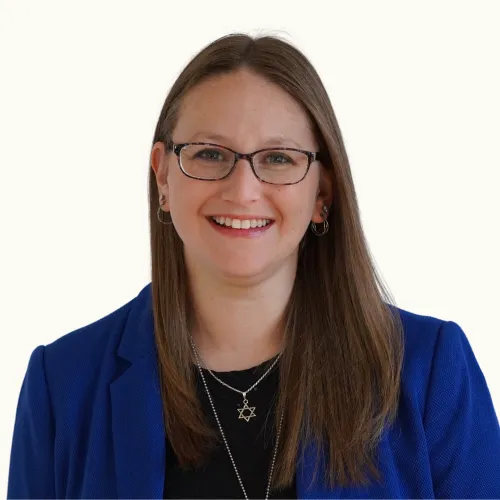We’re thrilled you are considering opening your home to one of our Israeli Shinshinim, who are dedicating a year of service to Jewish communities abroad. Hosting a Shinshin helps build lasting bridges between Israel and Jewish life in Atlanta. Below are some frequently asked questions to help guide you through the experience.
What Does Shinshinim Mean?
Shinshinim = an acronym for the Hebrew phrase “Shnat Sherut” (שנת שירות) meaning year of service
Shinshin = one male identified Israeli teen
Shinshinit = one female identified Israeli teen
Shinshinim = a group of Israeli teens including at least one male identified
Shinshiniot = a group of only female identified Israeli teens
Shlichut (שליחות) = The act of serving as an emissary (i.e. Shinshinim are on shlichut.)
Why Become a Host Family?
Hosting a Shinshin(it) brings Israel into your home in the most meaningful way—through a personal, ongoing relationship with an incredible young Israeli. Your family will share in their journey and gain a deeper connection to Israeli culture, society, and everyday life. As one of our past host families shared, “It’s the best gift you can give your family.”
What Is Required to Be a Host Family?
All you need is:
- A dedicated bedroom for the Shinshin(it), ideally with a bathroom nearby (shared bathroom is fine).
- At least one child in the home age 10-18. Additional younger or older children are great.
- A welcoming, non-smoking Jewish home.
- A parking space convenient to your home.
- The willingness to provide basic living needs and food for an additional person.
You do NOT need to be affiliated with a synagogue or Jewish organization. Just be ready to welcome a young Israeli adult as part of your family.
How Long Is the Hosting Commitment?
Each Shinshin(it) lives with their host families for about 4–5 months, living with two different families over the course of their time in Atlanta. The first family hosts from the second half of August through winter break, and the second family hosts from winter break until the Shinshinim leave for their summer camp assignments. The winter break move date is determined in conversation with both host families and the Shinshin(it).
Many host families also welcome their Shinshin(it) back for visits over the summer if they are in town during the Shinshin’s time off from camp, and some again at the end of camp for the few days before their flight home.
What Happens If/When Our Family Goes on Vacation?
It is up to each host family whether they would like to bring their Shinshin(it) along on vacation, but this must be approved in advance by the Director of Israel Engagement (Jenn). In general, Shinshinim are not permitted to take vacations that conflict with their work schedule.
While on shlichut, Shinshinim are only allowed to travel within the 50 United States; international travel and travel to U.S. territories are not permitted.
If your Shinshin(it) is not joining your family on vacation, that’s perfectly fine! However, Shinshinim must always have an adult present overnight and cannot stay alone in your home. If needed, we will help arrange a short-term stay with another family during your time away.
Should I Know Where My Shinshin Is at All Times?
Host families are provided with a basic schedule outlining where and when the Shinshinim are working. You are not expected to track their movement, but as with your own teens, having a idea of their whereabouts is always helpful. Many families choose to add their Shinshin(it) to their family text thread and/or use apps like Life360 or Find My Friends to stay connected.
Additionally, the Director of Israel Engagement will maintain Life360 access for all the Shinshinim.
What Are the Benefits of Becoming a Host Family?
- A lifelong connection with a young Israeli and their family
- Deepened engagement with Israeli culture and the broader Jewish world
- The joy of mentoring and supporting a remarkable teen during a transformative year
Who Provides the Shinshinim with Toiletries?
Host families are encouraged to provide basic toiletries like soap, shampoo, toothpaste, and toilet paper. Some Shinshinim choose to bring products from home and that is ok also. We encourage host families to have a conversation with their Shinshin(it) to understand what the exact needs are.
Does My Shinshin Need a Key to My House?
Yes. As part of your family, your Shinshin will need access to your home, including a key or door code and alarm code if applicable. When the Shinshin(it) moves out, you are entitled to your key back.
Do I Need to Provide Transportation?
No. In some years, Shinshinim have access to a shared pool of insured vehicles. When a car is not available—or if vehicles are not provided—each Shinshin receives a pre-loaded Uber account for transportation needs. Of course, you’re welcome to drive your Shinshin if you’d like, but it is not an expectation.
What If the Shinshin Needs Medical Care?
Shinshinim are covered by health insurance through the Jewish Agency under the company David Sheild. In America, it operates under United Health Care. The Shinshinim have their own insurance card, a 24/7 help line in Hebrew, and an app to make sure their needs are covered. Shinshinim are not provided with dental or vision insurance.
While in most scenarios, Shinshinim are fairly self-sufficient, if they need to visit a medical provider, we do want an adult to go with them. Medical English and the paperwork required can be incredibly overwhelming for the Shinshinim. If a host parent is unable to join the Shinshin(it) at the doctor, we will arrange for someone else to join them.
How Often Will the Shinshin(it) Be Home for Dinner?
Shinshinim are encouraged to join their host families for dinner a few nights each week. Since both the Shinshinim and families often have busy schedules, we recommend setting up weekly check-ins to help coordinate plans.
Many Shinshinim are used to having weekly Shabbat dinners, even if they are not religious. If your family does not typically have Shabbat dinner, that’s perfectly fine—but it might be a meaningful tradition to try a few times during your hosting experience.
What If My Shinshin(it) Is Not Home for Dinner?
That’s ok! Check in with them to see if they had plans to eat out or need to have food when they get home. Leftovers are perfectly acceptable as is requesting the Shinshin(it) to prepare a meal for themselves if they are not home for family dinner.
Who Does Their Laundry?
We encourage Shinshinim to be independent and do their own laundry. While many are used to doing their own laundry, they will need your help understanding how your machine works and what is the best day and time for them to do their laundry.
Do Shinshinim Have a Curfew?
Yes. All Shinshinim, regardless of community, have a curfew of 11:00pm as set by the Jewish Agency. Exceptions can be made in conversation with the Director of Israel Engagement.
We ask for your help in enforcing and communicating challenges as it relates to the curfew.
Can Shinshinim Babysit?
No. Shinshinim are in the U.S. on volunteer visas and are not allowed to make any kind of taxable income for babysitting or other work. Their downtime should be respected for rest and personal time.
Who Prepares Their Lunch?
Discuss this with your Shinshin(it). If your kids make their own lunches, the Shinshin(it) can too. If meals are prepared for others, consider including them. Just ensure they have food and feel comfortable.
Do Shinshinim Get Vacation Time?
Shinshinim have vacation time built into their schedules. They are off for Thanksgiving, winter break and Passover as well as a 2 ½ week trip home to Israel in February. There are a few long weekends and other holidays where Shinshinim are also able to take time for themselves. During their longer vacations, many Shinshinim have loved ones visit them from Israel.
How Do I Communicate with My Shinshin(it)?
Each Shinshin will have an American and Israeli phone number. Best practices would be to save both numbers in your phone should they choose to use their Israeli number for WhatsApp and their American number for local calls/texts. Make sure they have the phone numbers of everyone that lives in your household, and anyone else relevant to your lives, while they are living with you.
I'm ready to host a shinshin!
After you fill out this interest form, someone will reach out to you. Filling out this form is just expressing interest, not agreeing to host.

Director of Israel Engagement
Jewish Federation of Greater Atlanta
jhandel@jewishatlanta.org

Host Family Contact
Shinshinim Host Family Program Coordinator
Jewish Federation of Greater Atlanta
afox@jewishatlanta.org